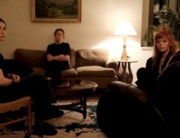
Even if many are hungry for everything the pandemic has robbed us of daily life, The Assistant is the rare film that reminds us that there are some nice things about staying home. In other words, office dynamics can be absolute hell.
This film, however, is not so much the examination of a collective hell as a personal one. Jane (Julia Garner), the office assistant of the title, works long hours for a New York City film production company. She is essentially everyone’s doormat. Two men (Noah Robbins and Jon Orsini), with whom she shares a small office, either ignore her or hover over her. (On a few occasions, when she is apologizing to her boss over email, they come over to her unsolicited and tell her what to type.) She gives the impression of enormous strength, though we can see the job is wearing on her. She has only been working at this company for two months.
The Assistant comprises a single day in her life. It’s a long day: she arrives when it is still dark and is one of the last to leave. We follow her through her profoundly unromantic day, much of which consists of her answering the telephone, standing by the copy machine, cleaning up the remains of food, and, most significantly, gritting her teeth while her colleagues treat her like dirt. The defining event, however, is her decision to make a complaint to human resources regarding the behavior of her boss (a man we hear but never see) toward young women. It doesn’t go very well, and it’s clear that all her officemates, both male and female, have resigned themselves to be complicit in wrongdoing.
There is a lot to admire in director Kitty Green’s narrative feature debut. There is no wasted time, and Green powerfully creates an uncomfortable and numbing atmosphere. The sounds that surround Jane (hums of machinery, the copy machine, hints of conversation behind cubicles) are ever present and brought to life in such a way that we feel a sensory as well as psychological link to her experience. Close-ups of Jane, and the machines that dominate her existence, further strengthen this link and seem as palpable and painful as her relationships with her coworkers.
Best is Garner’s performance, one of immense restraint and precision. Her character never yells. While a few tears roll down her face, she never really cries. Even in private phone calls with her parents, she doesn’t fully state how she feels. For the audience, she doesn’t need to, and Garner succeeds in bringing to light Jane’s rich and painful internal life, which is visible from the moment we first see her.
Nevertheless, there are still ways in which the film is lacking. While it dramatizes the exploitation of women and turns our eyes to one of the film industry’s many ugly undersides, the other characters are not so richly drawn as Jane. One could argue this doesn’t matter. It is, after all, her experience that the film explores, and it’s Green’s objective to draw our attention to the nastiness of so many people (especially men). Yet, when so many seem as though they have materialized to make Jane’s life hell, the film lacks some complexity. We can, in effect, quickly see where it’s going.
The Assistant is still a film I’d recommend, and is worth seeing for Garner’s performance alone. When the credits roll, we might look at the walls of our home with some relief.






Leave A Comment